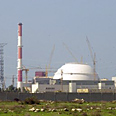
Strike on Iran's nuclear sites too dangerous
צילום: איי פי
Countering Iranian threat
Comprehensive Arab-Israeli peace deal is best way to undermine Iranian strategy
The nightmare of a nuclear Iran haunts both Israelis and Arabs, yet Israel and America are the ones pushing the effort to curb Iranian ambitions. The America-Iran-Israel triangle is where the root of the problem lies, as well as a possible solution.
Khomeini's revolution indeed severed the old Israeli-Iranian alliance, yet both countries continued to do business, with American encouragement. The Iran-Contra affair that saw Israel providing weapons to Iran in its war against Iraq is an excellent example.
As two non-Arab powers in a hostile Arab environment, Israel and Iran shared common interests that even the Islamic revolution could not erase.
Iran and Israel reached the point of overt confrontation only during the Rabin era. This stemmed from the strategic change that followed the American victory in the Gulf War and the Soviet Union's collapse.
The Arab-Israeli peace process, under America's patronage, resulted in a series of breathtaking achievements – the peace conference in Madrid, the Oslo Accords, the peace treaty between Israel and Jordan, a near-agreement with Syria, and the establishment of Israeli missions in most Arab states. All this constituted a nightmare for Iran, which was feeling increasingly isolated.
At this junction, Israel and Iran – two forces competing for supremacy in a rapidly changing region – chose to present the strategic contest between them in ideological terms. Now, the confrontation pitted Israel, which carries the beacon of democracy and fights the spread of the Shiite empire, against Iran, which chose to defend the revolution by enlisting the Arab masses on behalf of Islamic values and against the treacherous leaders that decided to forego Palestinian rights.
Iran, more than it was Israel's enemy, was an enemy of the possibility of Arab-Israeli reconciliation. Therefore, the Ayatollah regime chose to incite the masses to engage in anti-Jewish and pan-Islamist discourse, as a way of extracting Iran from isolation and present its regional ambitions in a manner acceptable to the Sunni masses.
Iran does not aspire for nuclear capabilities in order to destroy Israel, but rather, as means for boosting its reputation and influence in a hostile environment and enhancing the challenge it presents to the regional order.
Strike on Iran may prove too dangerous
Yet Israel still has reason for concern, because a nuclear Iran may be encouraging to Israel's regional enemies and accelerate developments that may spin out of control.A strike on Iran's nuclear sites may prove too dangerous and its results are uncertain. Economic sanctions, as severe as they may be, apparently won't lead Tehran to surrender. The internal split among Iran's elites also won't lead to regime changes in the near future.
Yet radicalism is not necessarily a sign of irrationality, and revolutionary Iran provided proof of pragmatism in the past: Iran backed the United States in the first Gulf War, yet remained out of the loop in the Madrid peace conference. It also backed the US in its war against the Taliban regime in Afghanistan.
In the spring of 2003, when the US Army overcame Saddam Hussein's army, the encircled Iranians were quick to propose a huge deal where all controversial issues would be brought up for discussion, including the nuclear question, Israel, Hizbullah, and Hamas. In addition, the Iranians declared that they would no longer sabotage the Israeli-Arab peace process.
However, conservative arrogance prevented a pragmatic response to the new voices coming from Tehran. The line maintained by the Cheney-Rumsfeld axis was "no talks with evil."
When America's Mideast policy was revealed as unstable, Iran's mood changed as well. However, it appears the only way to address the dead-end is through a grand bargaining process. Yet this won't happen through diplomatic sanctions or American deployment of Cold War methods aimed at breaking Iran's spine by leading to a destructive arms race.
Iran does not draw its growing regional influence from its military budget, which is still lower than that of its enemies, but rather, from the challenge it presents to the US and Israel by using "soft power."
The best way to undermine Iran's strategy of creating regional instability is through a comprehensive Arab-Israeli peace accompanied by massive investment in human development. This will be followed by international funding for the creation of a peace and security system in a nuclear-free Middle East.










